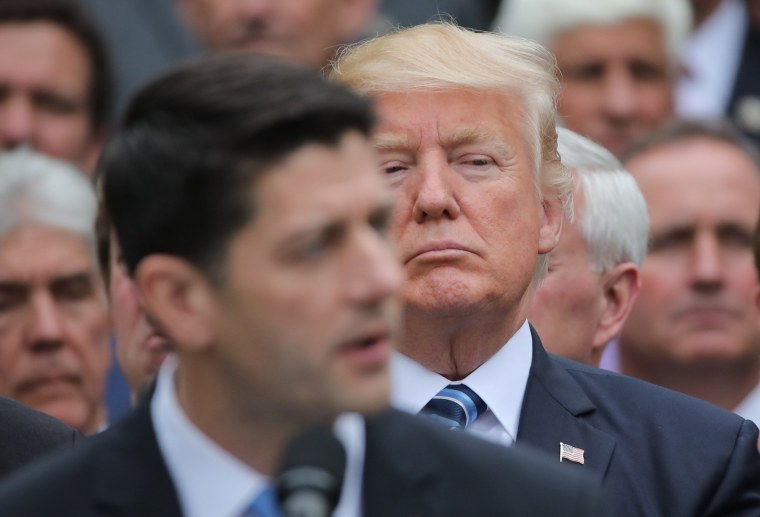The Republican plan has never been a secret: in the broadest sense, the party is guided by a vision of shrinking government revenues through reckless tax breaks, and then using the resulting deficits to demand sweeping cuts to social-insurance programs like Medicare and Social Security.
Donald Trump, however, told the nation that he had no use for the usual GOP game. As a candidate, the Republican said he liked the idea of having the wealthy pay more in taxes, not less, and promised never to cut Medicaid, Medicare, or Social Security. Indeed, in his campaign kick-off speech, Trump said he’d make no cuts to the popular programs, and bragged about the vow via Twitter over and over and over again.
Pundits quickly labeled Trump a "populist," and working-class members of the GOP base swooned.
Keep that in mind when reading the Washington Post's report on House Speaker Paul Ryan's (R-Wis.) plans for what his party will do after it approves massive tax cuts for the wealthy.
House Speaker Paul D. Ryan (R-Wis.) said Wednesday that congressional Republicans will aim next year to reduce spending on both federal health care and anti-poverty programs, citing the need to reduce America's deficit."We're going to have to get back next year at entitlement reform, which is how you tackle the debt and the deficit," Ryan said during an appearance on Ross Kaminsky's talk radio show. "... Frankly, it's the health care entitlements that are the big drivers of our debt, so we spend more time on the health care entitlements -- because that's really where the problem lies, fiscally speaking."Ryan said that he believes he has begun convincing President Trump in their private conversations about the need to rein in Medicare, the federal health program that primarily insures the elderly.
There's a lot to this, but let's focus on just two angles. The first is recognizing the audacity of Paul Ryan's shameless scam.
The House Speaker apparently expects Americans to believe it's important to "tackle the debt and the deficit," despite the fact that Ryan voted for both of George W. Bush's tax cuts, both of George W. Bush's wars in the Middle East, Medicare Part D, and the Wall Street bailout -- none of which Republicans even tried to pay for.
More to the point, if the Wisconsin congressman had even the slightest interest in balancing the budget, he wouldn't be championing a tax plan that adds $1 trillion to the deficit over the next decade. It's a bit like listening to an arsonist demand money to rebuild the home he just burned to the ground: the person responsible for creating the problem shouldn't whine about how eager he is to get others to fix the problem.
But the other part of this is Trump's intentions. It's quite likely that he's president today because he promised the nation that, his party's orthodoxy notwithstanding, he wouldn't cut the core pillars of the social-insurance state.
Trump has already expressed a willingness to ignore part of that commitment, embracing the Republican Party's health care plan, which included brutal Medicaid cuts. The president's budget also included cuts to Social Security, though they targeted disability insurance, not retirees' benefits. (Trump's far-right budget director, Mick Mulvaney, told an incredible story in September in which he bragged about tricking the president into ignoring his campaign promise.)
And now Paul Ryan wants Trump to agree to Medicare cuts, and the Speaker believes he's "begun convincing" the president to go along with the plan. Given Trump's willingness to ignore so many of his other commitments, and the ease with which the president takes aim at the interests of those he vowed to protect, it's likely Ryan is correct about the efficacy of his pitch.
Postscript: The House Speaker isn't alone on this. Sen. Marco Rubio (R-Fla.) spoke to a group of business leaders last week and complained that "the structure of Social Security and Medicare" is "the driver of our debt."
Of course, if Rubio were genuinely concerned about the debt, he wouldn't have just voted for his party's regressive and expensive tax plan.
